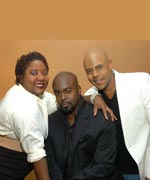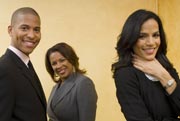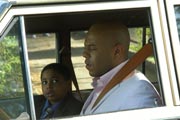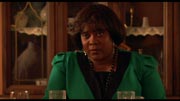While multimillion-dollar flicks duke it out for box office domination and a bald statue this Oscar season, a handful of smaller-budgeted, riskier holiday films are competing for the Little Miss Sunshine sash of 2008. And talk about risk: The poignant Dirty Laundry (Codeblack Entertainment) dares to become the first wide-release film in recent memory featuring an African-American gay character dealing with homosexuality and the black family. Years in the making—and the funding—the movie debuts in New York and Los Angeles on December 7 before hitting nationally December 28. Directed by Maurice Jamal (Chappelle’s Show, The Ski Trip), it has built considerable buzz on the festival circuit.
 |
| Dirty Laundry’s trifecta: Devine, Jamal and Dunbar |
Set in make-believe rural Paris, Georgia, the film follows a churchgoing black family adjusting to the return of prodigal gay son Patrick (Prison Beak and Soul Food’s Rockmond Dunbar), who has been working in New York City for 10 years as a magazine journalist. After being surprised by his own long-lost son, Patrick is forced to leave his cushy city life of Sunday brunches and Fifth Avenue shopping sprees—to confront his mother Evelyn (original Broadway Dreamgirl Loretta Devine), coming out and the power of forgiveness.
Dirty Laundry also stars Jamal himself, Jenifer Lewis (Jackie’s Back!), Terri J. Vaughn (The Steve Harvey Show), Sommore (The Queens of Comedy), Alec Mapa (Half & Half), gospel star Dr. Bobby Jones and supermodel Veronica Webb. Although family-oriented films are not new to black culture—especially since Tyler Perry’s Madea series—gay-themed family films are. “Historically, we have been behind the mainstream community incorporating homosexuality in our culture,” says executive producer Nathan Hale Williams, who is gay. “We are in your family, your church, and yet many of us sit in silence.”
 |
| Executive producers Nathan Hale Williams, Adrienne Lopez and Crystal McCrary Anthony |
To break that silence, Jamal, who also is gay, decided it was high time he turned his idea into a script. “I am interested in making movies that have never been made before,” he says. “Urban audiences and diverse audiences want to see black characters who are layered and complex.” While viewers may be ready, acquiring funding and studio backing was hardly guaranteed. “Because there is a white character in the film,” Jamal says, “one particular studio kept saying, ‘Let’s develop him more.’ They were totally ignoring the black family dynamic.” Having turned down that studio’s $250,000 offer—Jamal declines to name the company—he raised the money himself. “It was hard,” Jamal says. “People told me I could never get a cast, I could never raise the funds, I could never get a deal. But they were wrong.”
It was that tenacity and vision that attracted Devine and Dunbar to sign on—even though Jamal could not pay their standard salaries. “When I read the script, I was so amazed by the Evelyn character,” Devine says. “This was different than anything I had ever played.” Dunbar agrees: “I was offered another role in a different movie but chose this one because I wanted to play this character because it was so challenging.” He also wanted to be part of something that would spark a much-needed conversation, especially in the black church. “We have to stop the hypocrisy and start addressing these issues,” he adds.
 |
| Patrick trying to bond with his son Junior |
Although lesbian, gay, bisexual and transgender (LGBT) characters and plotlines have evolved with such television programs as Queer as Folk and Will & Grace and the critically acclaimed dramatic film Brokeback Mountain, people of color have been largely invisible in those narratives. Those gay people of color who have made it to the large or small screen have usually been one-dimensional characters—who typically embody either the flamboyant, finger-snapping stereotype or the Law and Order-ish down-low thug who is spreading HIV in the black community. Jamal hopes that gay black men will be empowered by the complexity of his Patrick character. “It’s difficult for gay men of color to engage in healthy loving relationships when we don’t even have examples of that in the light,” he says. “ Which [in essence] can lead to risky behavior. Dirty Laundry isn’t just about coming out; it’s about coming to terms and rectifying all of the [issues] in our lives in a healthy way.”
In April 2006, the Human Rights Campaign (HRC), the nation’s largest LGBT organization, sponsored a five-month sneak-preview tour of the film in 10 cities. It’s been winning awards along the way, including a Best Actress prize for Devine and a Blockbuster Audience Award for Best Picture at the American Black Film Festival. The public response at these screenings? “People were lined up around the street,” Jamal says. “Parents and kids, telling me that [because of the movie] they were going to have a conversations with their loved ones.”
 |
| Evelyn at the Sunday dinner table |
To sustain the hype, Jamal has been spreading the word with hefty endorsements from regional chapters of churches, black sororities and social justice organizations—along with grassroots efforts such as e-mail blasts and good old word of mouth. “It’s so incredibly important to see the film opening weekend,” he says, “If the numbers aren’t there, it won’t have a chance to find a home in other theaters or an audience. In this industry, black films are underrepresented, under-marketed and underfunded and then we are told they are going to pull our films when they are not performing well. So it is key that we get that initial support.” As to why the movie chose to explore such a serious topic in comedic form, executive producer Williams says, “Before you can have a Brokeback Mountain, you need a Birdcage. This is our black Birdcage.”
Pictures courtesy of Codeblack Entertainment.
View the trailer:
Want to see the film on opening day? Contact these theaters for exact show times.
New York: Clearview Chelsea West Theater
333 West 23rd Street (between 8th & 9th)
Los Angeles: Mann Beverly Center Cinemas
(Inside Beverly Center) 8522 Beverly Boulevard






3 Comments
3 Comments